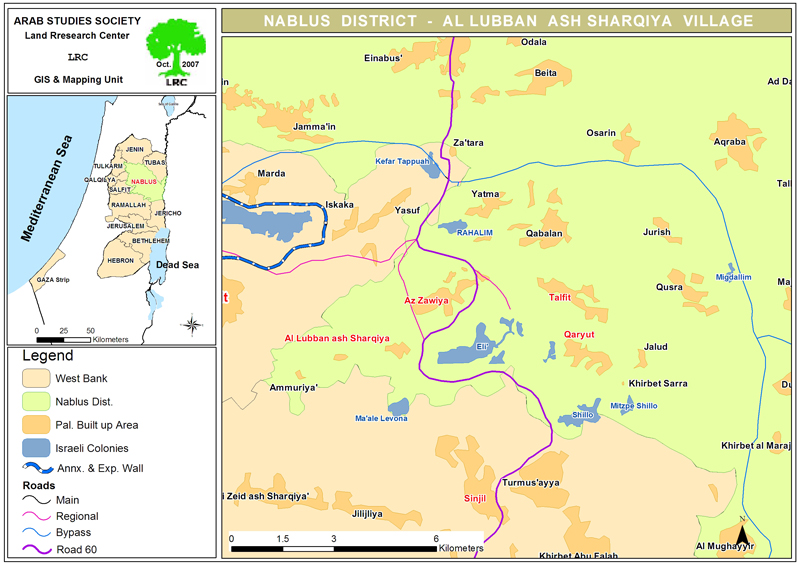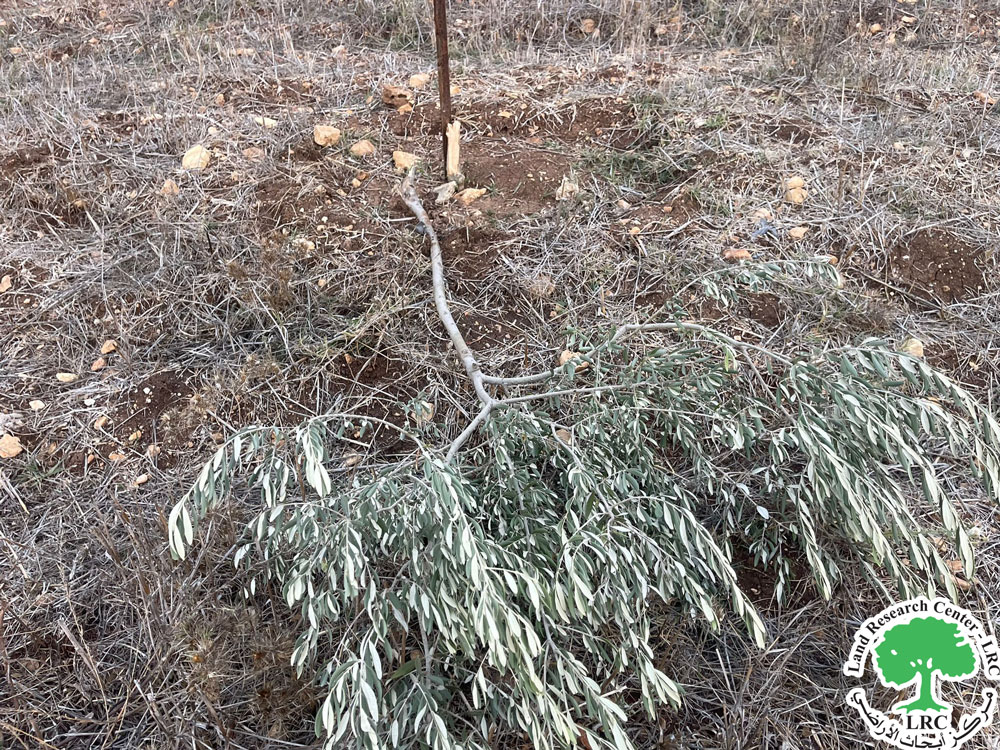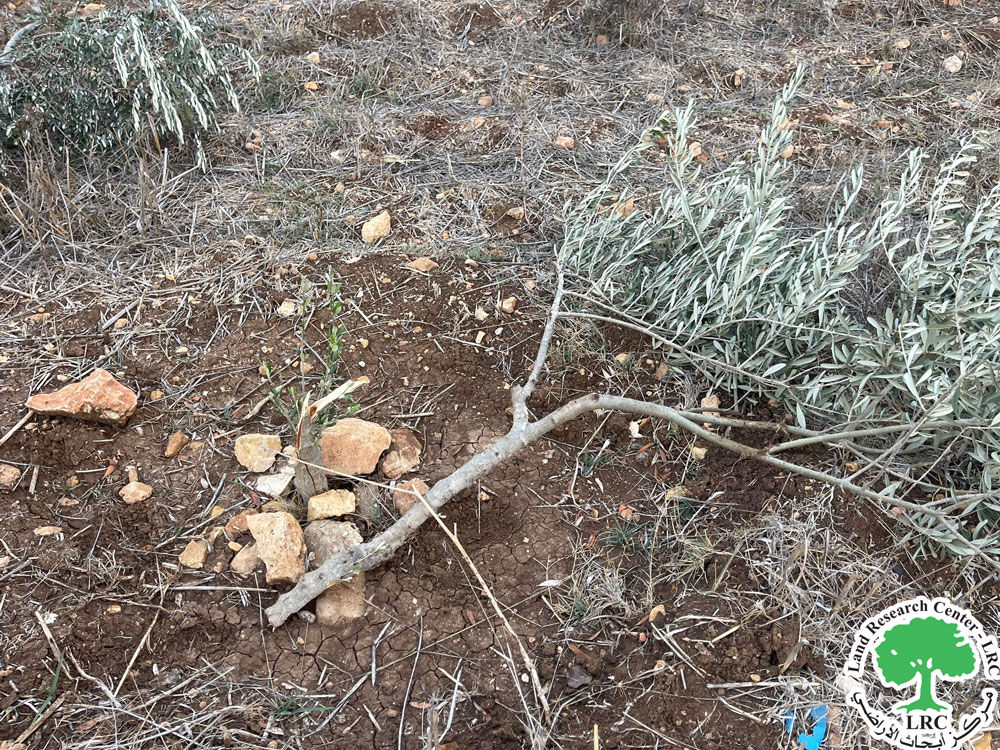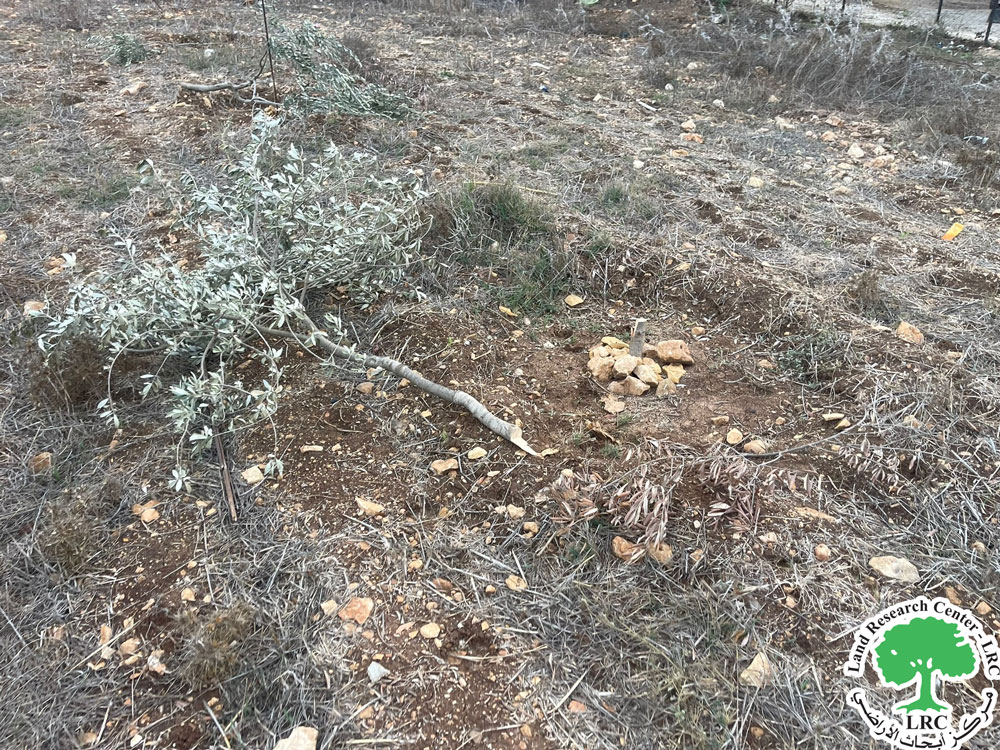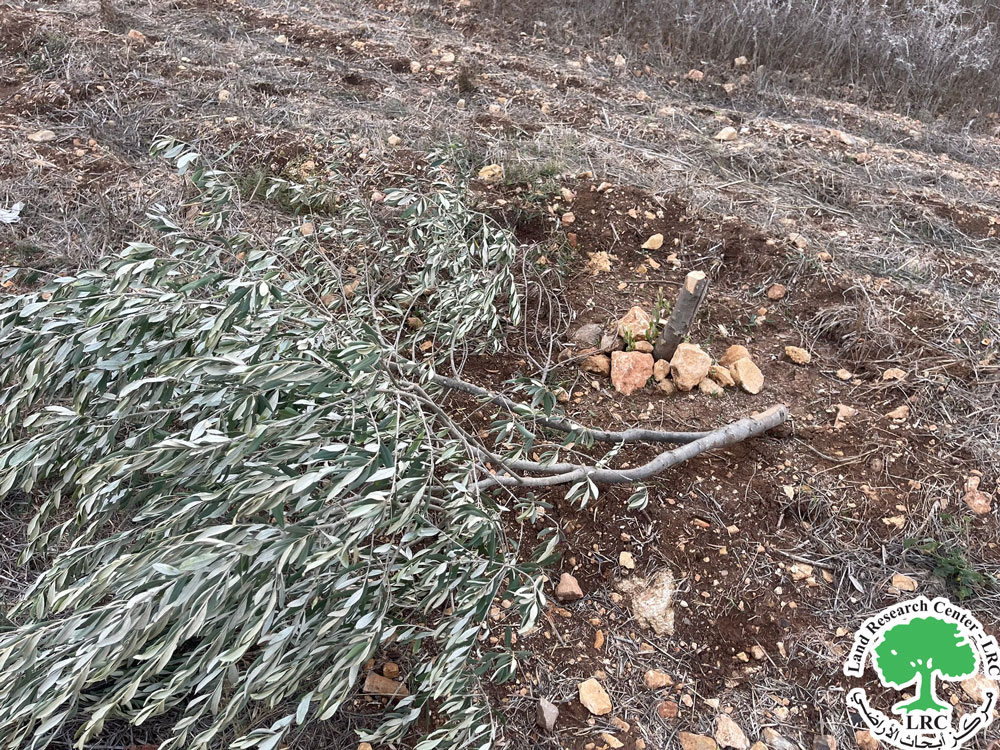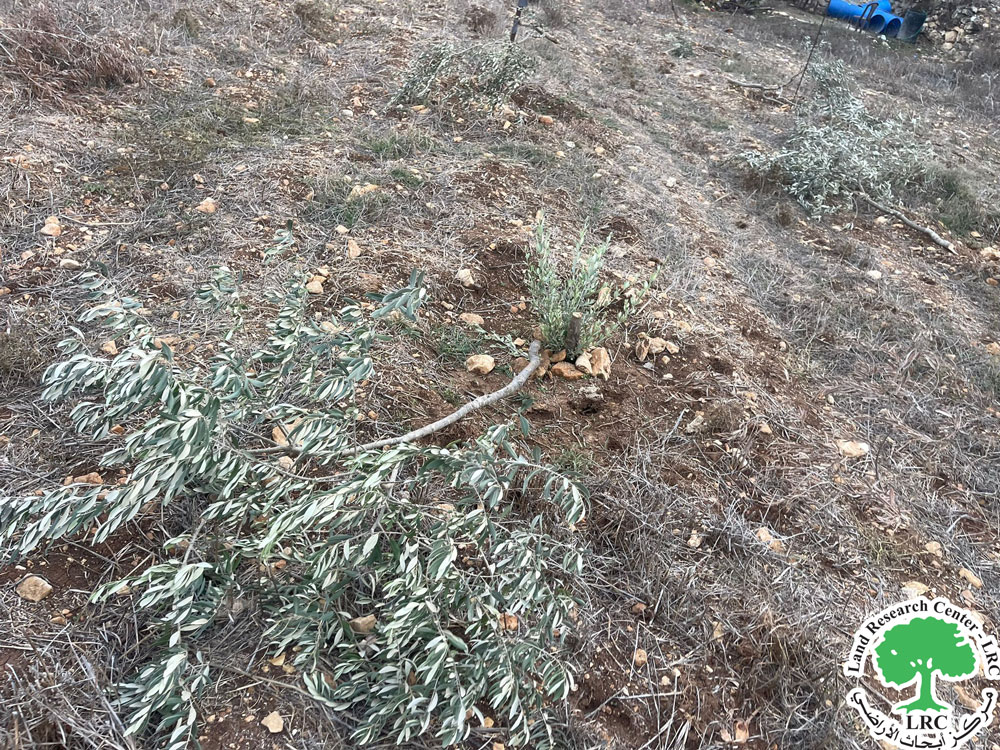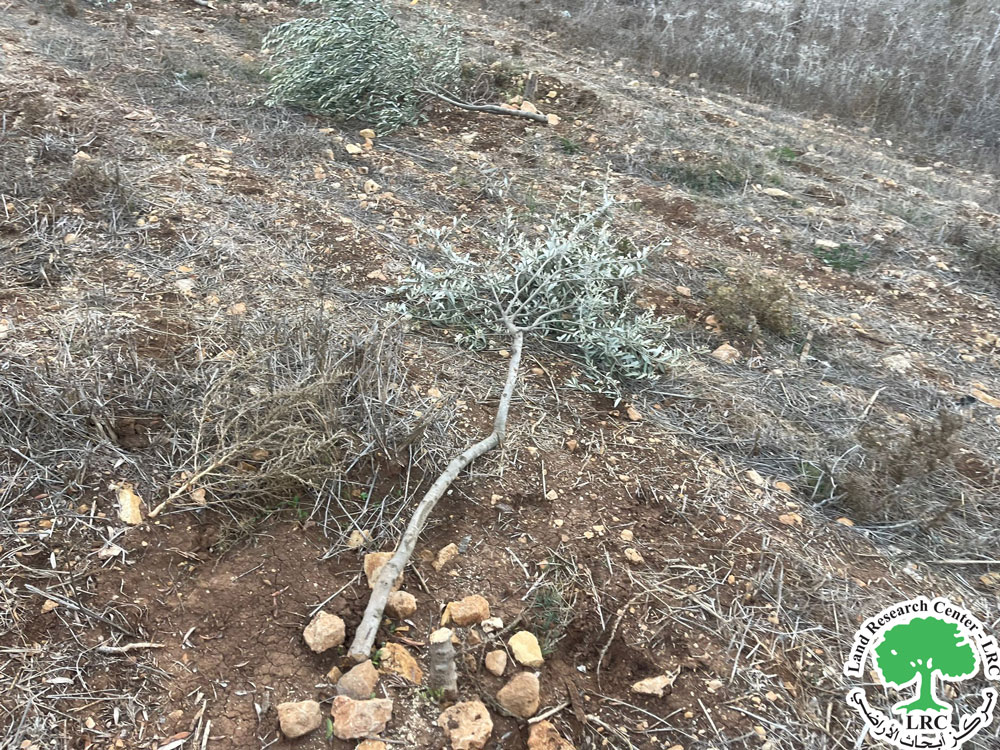Israeli colonial settlers cut 73 olive seedlings from the village of Al -Lubban Al Sharqiya / Nablus / Governorate
Violation : cutting and vandalizing 73 olive seedlings
Location : Al Lubban Al Sharqiya village south of Nablus city.
Date : 21/11/2024
Perpetrators : “ Ma’ale Leona “ settlers
Victims : Three families from the village
Details:
As the evening hours of Thursday , November 21 2024 , a group of settlers believed from Ma’ale Levona attacked “Al -Sahal’ area located to the east of Al- Lubban Al Sharqiya village , more specifically near the bypass road number 60 .
it reported that a group of settlers proceeded and destroyed 73 , five years old olive seedlings, other than cutting their stems with sharp tools , which led to the complete destruction of those seedlings , before they leave from the site.
These trees are owned by three farming families from the village of Al- Lubban Al- Sharqiya according to the following table :
The affected farmer | Number of family members | Number of Females | Number of children under 18 years | Number of trees affected | The area of land |
Hamed abd al Fattah Daraghmeh | 4 | 2 | 0 | 27 | 2 |
Sedqi Mahmoud Al Aghbar | 7 | 3 | 2 | 29 | 3 |
Nabeel Yousef Awis | 6 | 3 | 2 | 17 | 1 |
|
|
| 4 | 73 |
|
Total | 17 | 8 |
|
| 6 |
The affected farmer Hamed Abd al Fattah Daraghmeh told LRC:
I own an agriculture plot located at the eastern entrance of Al-Lubban Al Sharqiya village .for many years, I have been cultivating it with various vegetables, grains, and several trees, including olive, fig, and grape trees. Since the 7th Of October, I have been suffering from continuous attacks of settlers, two months ago, the settlers cut and destroyed 13 of my grape and olive trees , uprooting their entire trunks. Two days prior to that incident , the “guard of settlements” forced me to leave my agriculture land. Today I was shocked to find that the settlers cut the fence leading to my and the land of neighboring farmers during the night, and cut off olive seedlings. As a result about 73 seedlings of olive were completely destroyed , we reported what happened to the village council , we are working on replanting the land , because it’s under the threat, and if we leave it abandoned ,the settlers will take the control of it completely.
It is reported that this is not the first time that trees have been attacked by settlers, but this act has been repeated several times by settlers from other settlements, especially the settlement of “Ma’ale Levona ”, who have been reported to cut and destroy of dozens of olive trees south of Al Lubban village, in addition to other attacks caused by such settlers .
Attacks on trees… a form of Israeli violations to Palestinian environment:
The frequent attacks by settlers and the army on Palestinian trees are increasing notably. According to the research team at the Land Research Center, the occupation targeted more than 57,323 of trees and seedling from the beginning of 2024 until October 31 2024 – the highest since 10 years ago. 90% of these trees have been completely destroyed, that warns a real environment disaster especially, since trees are lost whether by cutting or burning or poisoning. This results in a decrease in the number of trees , which means a decrease in the area of vegetation cover. Which provides the region with large amounts of oxygen and rids it of carbon gas, and when trees are lost the animals will not able find shelter and food , threating the extinction of some animal due to the destruction of their nature habitat and which harms Biodiversity.
Al- Lubban Al Sharqiya [1]:
Al- Lubban al Sharqiya is located in the southwestern part of Nablus governorate, 20 kilometers south of Nablus city, the village is considered the last southern villages in Nablus governorate, surrounded by several Palestinian villages such as : al Sawia, Qaryut , Ammuriya , Yasuf , Sinjil , Aboueen , Salfit and Iskaka .
The total area of the village is about 12075 acres , this is about the structural plan of village in addition to 240 acres about plain lands that planting with seedlings and vegetables through all the year, and 700 acres are directly subjected to colonial activity on the lands of village, and 200 acres were destroyed under the road (60) and the remaining lands are planted with almond, olive and fig trees. (Source : Geographic Information Systems Unit – Land research center).
The village has two main families : Awaisah and Daraghmeh, the total population now is approximately 2900 people, the unemployment rate in the village is about 51% due to closure , siege, and land confiscation practices. It mentioned that only 14% of population they work on government and private sector jobs and the rest depend on agriculture as their primary source of income.( Source : The Village Council of Al – Lubban Al Sharqiya Village)
[1] The Source : Land Research Center
Legal Commentary:
The Palestinian environment, in general, is subjected to numerous environmental violations by the Israeli occupation, disregarding all international and national laws and norms related to the protection of environmental rights. The right to live in a clean and healthy environment is an inherent human right. Despite Israel's signing of major environmental protection agreements, such as the Basel Convention (1989), the Rotterdam Convention (2008), the Stockholm Convention (2001), and the Ramsar Convention (1971), as well as air quality and climate protocols, it continues to violate these treaties without accountability or oversight.
In addition to specific provisions regarding the right to a clean and healthy environment for those under military occupation according to international laws, conventions, and treaties, such as the International Covenant on Economic, Social and Cultural Rights, adopted by the United Nations General Assembly (Resolution 2200A (d-21)) on December 16, 1966, Article 1, Paragraph 2 states:
"... all peoples have the right to freely dispose of their natural wealth and resources without prejudice to any obligations arising from international economic cooperation, based on the principle of mutual benefit, and international law. In no case may a people be deprived of its own means of subsistence."
This legal framework highlights the violation of Palestinian rights to a clean environment, free from destruction, pollution, and exploitation by the occupying power.
There is no doubt that the attacks carried out by the Israeli side violate the laws of the "occupying state" itself, in addition to international laws. Referring to the details of this case, the Israeli Penal Code of 1977 and its amendments stipulate that any violation of another's property to commit an illegal act is punishable by law. According to Article 447, it states:
"Anyone who commits any of the following with the intent to intimidate, insult, or harass the property owner or commit a crime shall be punished with imprisonment for two years:
- Entering or crossing the property;
- After entering the property legally, staying there illegally.
(b) A crime under this section is committed when the perpetrator carries a firearm or a cold weapon, and the penalty is four years in prison."
Reading this article, it is clear that the Israeli Penal Code criminalizes merely entering someone else's property without authorization for the purpose of insult, harassment, or intimidation, and punishes such an act with two years in prison. The penalty increases when the perpetrator enters the property and commits a crime using a weapon or a sharp tool, or even when agricultural land is attacked through cutting, burning, or destruction, as explicitly criminalized in the aforementioned article.
Therefore, the Israeli aggressor violates both international law and the laws of its own state, committing a clear violation. Accordingly, the "Israeli judiciary" should hold the settlers accountable and punish them for these acts according to their own legal provisions. However, there is no legal accountability for the perpetrators by the Israeli judiciary. Nevertheless, this does not negate the right of any person on this land to live in a clean, safe, and protected environment free from any violations or attacks.
مشروع: حماية الحقوق البيئية الفلسطينية في مناطق "ج" SPERAC V - FCDO
Disclaimer: The views and opinions expressed in this report are those of Land Research Center and do not necessarily reflect the views or positions of the project donor; the Norwegian Refugee Council.
إخلاء المسؤولية: الآراء ووجهات النظر الواردة في هذا التقرير هي آراء ووجهات نظر مركز أبحاث الأراضي ولا تعكس بالضرورة وجهات نظر أو مواقف الجهة المانحة للمشروع؛ المجلس النرويجي. للاجئين
